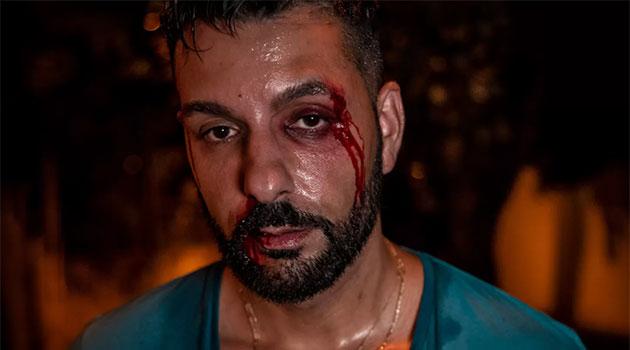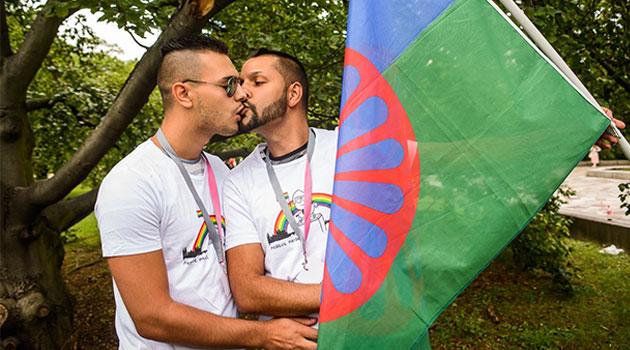Czech campaign online in support of LGBT+ members of the Romani community says life is "too short for us to hate our own children"

“I did a terrible thing” (Udělal jsem hroznou věc) is the name of a campaign that has been launched by the ARA ART organization in the Czech Republic. For quite some time the group has been raising the issue of the multiple discrimination of LGBT+ minority members who are Romani.
The purpose of the campaign is to raise awareness about the subject of multiple discrimination, as it is not addressed by Czech legislation. At the same time, the campaign targets the Romani community itself, for whom sexual minorities remain a taboo topic.
The campaign discusses stories from real life and presents one of them through a dramatic mini-film (subtitles in several languages are available for it online). The organization also offers counseling to LGBT+ members of the Romani community and their parents through this online site.
LGBT+ members of the Romani minority frequently face discrimination, and not just from the majority society because of their ethnic origin or sexual orientation, but also from Romani society, the very traditionally-oriented part of which perceives same-sex relationships as taboo. Sometimes LGBT+ Romani men and women are excommunicated from their entire community, including from their own family, and therefore they end up homeless and without any family members or friends to assist them.
VIDEO
The ARA ART organization has released a short film online based on actual events at the website www.udelaljsemhroznouvec.cz. Produced in the Romanes language, the film targets the Romani community as such and intends to open discussion and shift the perception of people of different sexual orientations from the level of taboo to the level of acceptance and the full embrace of the LGBT+ members of the Romani family.
“We have dedicated our work to the subject of the LGBT+ members of the Romani minority since 2012. We have come a long way since then, but one can never do enough outreach. Annually about 400 LGBT+ Romani men and women from all over the Czech Republic contact our counseling center. The topics that we address quite frequently there are bullying inside the family, fear of coming out, social control, and last but least, unfortunately, expulsion from entire communities including from one’s birth family. For example, at the beginning of the summer a young student contacted our counseling center whose family had thrown him onto the street with nothing but a plastic bag for his stuff after learning that he is gay. Some Romani traditional values are fine, but some have to be changed, and in the case of the LGBT+ Roma, this is absolutely essential. A different orientation should not be a trigger for a family’s negative reaction. For that reason we offer consultation to parents who do not know how to cope with their child coming out,” says David Tišer, director of the ARA ART organization.
The campaign of online outreach is being produced as part of a broader, more comprehensive project entitled “Make Roma LGBT+ more visible”, which was supported by the European Union’s Rights, Equality and Citizenship Programme and is being conducted in collaboration with the partner organizations Diverse Youth Network in Hungary and QUO VADIS in Slovakia. The project responds to the critical sitution of the LGBT+ Romani minority whose members are, as the targets of different forms of disadvantage and multiple discrimination, excluded from inclusion and integration measures and policies.
This community’s peripheral position amplifies their vulnerability and increases the risk that they will be subjected to hate speech, stigmatization, homophobia and non-acceptance, overall, from both non-Romani and Romani society. Concealing one’s different sexual orientation and sexual identity is therefore the only way to defend oneself against excommunication or social isolation from the Romani world.
For that reason, it is necessary to increase efforts to eliminate the barriers that are known to the public and to intensify interventions in the area of such persons asserting and defending their rights both domestically and at EU level. “We want to intensify multi-sector collaboration, to create a network among Romani NGOs, the academic community, educational institutions and the apparatus of the state so that together we can find new, systemic solutions that will contribute to addressing multiple discrimination not just in the Czech Republic, Hungary and Slovakia, but throughout the entire European region. There are 1.5 million LGBT+ Romani men and women living in Europe for whom there is no targeted professional aid. We believe that through this project, we will arrive at a point where institutions and stakeholders agree that such multiple discrimination is a problem of common European interest and that it is necessary to solve it systematically,” the ARA ART director said.
